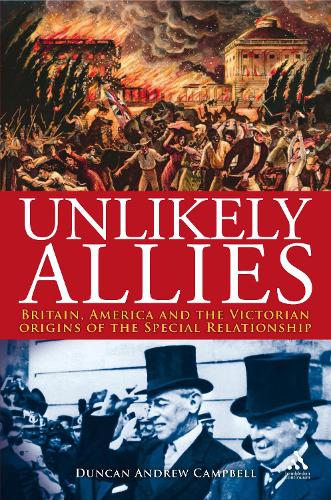
Unlikely Allies: Britain, America and the Victorian Origins of the Special Relationship
(Hardback)
Publishing Details
Unlikely Allies: Britain, America and the Victorian Origins of the Special Relationship
By (Author) Duncan Campbell
Bloomsbury Publishing PLC
Hambledon Continuum
1st December 2007
United Kingdom
Classifications
General
Non Fiction
History of the Americas
International relations
327.4107309034
Physical Properties
Hardback
320
Width 156mm, Height 234mm
300g
Description
When people speak of the special relationship between the two English-speaking peoples on either side of the Atlantic, they are talking of a phenomenon not much older than Britain's 1904 entente cordial with France. The very term English-speaking peoples' most probably has no earlier pedigree than William Gladstone. For much of the nineteenth-century, Britain and the United States were imperial rivals in the scramble for North America, and their often difficult relationship directly reflected that reality.
That these two nations became friends and allies was never a foregone conclusion until surprisingly late in the century and the rapprochement between them only was only cemented by the First World War. At the same time, the fact the United States was a former colony and that they therefore shared a common language meant that communication between the two nations differed to that between Britain and its European rivals - something Otto Von Bismarck called the most important fact of the nineteenth century. Starting with the War of 1812 when the United States and Britain found themselves on opposite sides, continuing through prominent and obscure Britons' and Americans' views of each other, the economic and migrant links between the nations, their difficult diplomatic relationship, their later developing friendship and increasing cultural and economic ties and concluding with the First World War, this work describes and analyses the often turbulent and surprising relationship between Britain and the United States in the nineteenth century.
Reviews
"This is an intriguing study that shows the 'special relationship' is still in a state of flux."-Good Book Guide, 2008
"The book explodes myths... [Campbell] argues fluently that 'whatever each had gained, they had, at least, not taken it from the other.' This entertaining and illuminating book shows the process developing, often with two steps forward and one step back, until they drew together, as that which they shared gradually outweighed that which divided them." - Jon Latimer in History Today, 2008
Title mentioned in article by the author in Yorkshire Post, 2008.
'Unlikely Allies presents a well-written overview of its subject that offers newcomers a thorough introduction.' - Victorian Studies
"Unlikely Allies is an important corrective to the many less critically grounded studies of Anglo-American relations." British Scholar Journal, September 2008.
"Campbell (Univ. of Wales, Swansea) describes considerable hostility at the start, deriving from lingering bitterness over the War of 1812 and repeated US threats to annex Canada. Nevertheless, Campbell firmly debunks the idea that a substantial sector of the British ruling classes was eager to support the Confederacy in the US Civil War... Eventual rapprochement between the two nations came, Campbell suggests, through personal contacts, especially literary ones, and economic factors, including an Anglo-American copyright agreement. Well written, well researched, and inexpensive, this is an attractive choice as a "middle book" in survey courses on British history since 1688. Summing Up: Highly recommended. All levels/libraries." -J. R. Breihan, CHOICE, February 2009
'A lot of apple-carts are overthrown in this engaging book when it comes to Anglo-American influences and relations.It[raises] interesting questions.' - Contemporary Review
Review in The International History Review, September 2009
Author Bio
Duncan Andrew Campbell's first book, English Public Opinion and the American Civil War, was nominated for the 2004 Lincoln Prize. His most important work before that was The American Civil War, Literary Sources and Documents (2000) which he co-edited with Jon Roper. Besides publishing in Anglo-American relations, he has taught in the department of American Studies, University of Wales Swansea since 1998. He has commented on current US affairs on the BBC and acted as advisor to programmes about the American Civil War. He currently resides in Washington DC.
